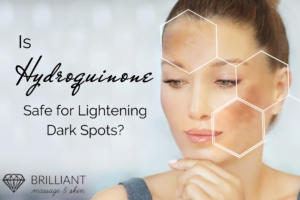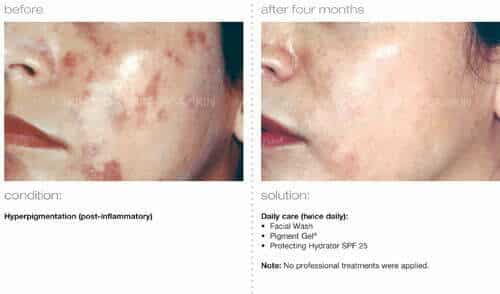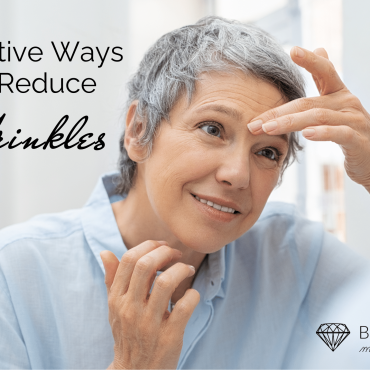Is Hydroquinone Safe for Lightening Dark Spots?


It can be hard to know the truth or the right questions to ask! So here are the facts behind Hydroquinone.
What is Hydroquinone?
Hydroquinone has been used for over 50 years and was banned by the FDA for a short time. The ingredient works by decreasing the formation of melanin in the skin. Melanin is the pigment in the skin that gives it a brown color. Hydroquinone-based products were banned temporarily when, in South Africa, high concentrations of those products (in upwards of 20 percent!) created a skin disorder called Ochronosis. It turned the skin a bluish shade. Not cool. But if you research further, you will also find high amounts of illegal contaminants – including mercury – in those Hydroquinone products. The ban was lifted when researchers discovered this. But now, years later, there is still a stigma associated with using Hydroquinone.
When made correctly, Hydroquinone is not a harmful ingredient, so if you’re thinking about whether or not to use it to fade discoloration, get as much information about the product as possible. It is also essential to learn about the causes of your discoloration, how to treat it, and how to prevent future skin discoloration. Here. Let me make this even more straightforward – I’ll give you all these answers below! Niiiice.

Cause and Treatment of Discoloration
1. The cause of skin discoloration is mainly genetic. However, hormones, sun exposure, heat, excessive or constant rubbing, injury, thyroid disease, and even stress can play a role in discoloration and melasma.
2. Melanin is produced naturally in the body, so it’s unrealistic to say we can ‘cure’ pigmentation. However, researchers have found that we can use products topically to ‘inhibit’ melanin production. These topical products include Hydroquinone, Kojic Acid, and licorice root.
3. Pair your topical lightening product with a chemical peel using a natural acid for home use or a deeper one at your favorite skin clinic or dermatology office (Glycol, Salicylic, Lactic, Vitamin A, etc. all work!), and you’ll get your results so much faster! Why? The more detaching of superficial dead skin you can achieve, the less skin the lightener has to penetrate. This creates a much more efficient (and practical!) result.
Choosing the Right Product
4. Make sure the products you choose are as pure as possible; the fewer dyes, fragrances, and preservatives, the better.
We use and recommend PCA Skin Care. They have a pigmented gel with HQ and HQ-free pigment gel that might still be worried about using it or has a sensitivity for this.
5. Speak to the person selling the product. Do you trust them? Common sense generally rules in my book. I will be suspicious if someone claims something is ‘all organic’ but has a year’s shelf life or needs refrigeration. Imagine a banana sitting out for a year and not spoiling. It’s just not possible. I tell my clients that anything medicated lasts about four months before it starts to lose its potency. The more additives and preservatives these products have, the longer the shelf life will render the product less effective. Instead, I would use a stronger and purer product with a shorter shelf life. Gather as many facts as possible, and then make your judgment call.
6. Products and chemical peels don’t guarantee that discoloration and melasma won’t return. You can’t escape the sun if you live in a country with a sunny climate. But prevention is critical. Treatment of pigmentation requires the use of sunscreen. You must reapply SPF 30+ every two hours if in the sun. Wear protective hats, sunglasses, and lip balm. You didn’t get melasma overnight, and it won’t go away that quickly, either. I firmly believe that fewer products used more consistently over the long term will always be better. Much better than using products aggressively or intermittently. Doing the latter could burn you, potentially hyper pigmenting (darkening) you further.
There is a lot to know. But don’t be afraid to ask questions. Read the labels and familiarize yourself with your products. Don’t have the time or energy? No problem! Ask a skin professional you trust.
Brilliant Massage Therapy
Burlington, Vermont


